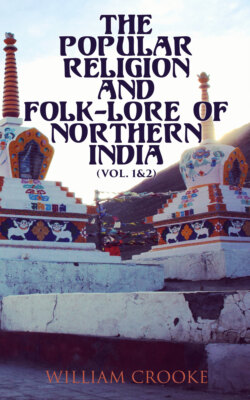Читать книгу The Popular Religion and Folk-Lore of Northern India (Vol. 1&2) - William Crooke - Страница 85
На сайте Литреса книга снята с продажи.
Journey forbidden during an Epidemic of Small-pox.
ОглавлениеTable of Contents
During a small-pox epidemic no journey, not even a pilgrimage to a holy shrine, should be undertaken. Gen. Sleeman13 gives a curious case in illustration of this: “At this time the only son of Râma Krishna’s brother, Khushhâl Chand, an interesting boy of about four years of age, was extremely ill of small-pox. His father was told that he had better defer his journey to Benares till the child should recover; but he could neither eat nor sleep, so great was his terror lest some dreadful calamity should befall the whole family before he could expiate a sacrilege which he had committed unwittingly, or take the advice of his high priest, as to the best manner of doing so, and he resolved to leave the decision to God himself. He took two pieces of paper and having caused Benares to be written on one and Jabalpur on the other, he put them both in a brass vessel. After shaking the vessel well, he drew forth that on which Benares had been written. ‘It is the will of God,’ said Râma Krishna. All the family who were interested in the preservation of the poor boy implored him not to set out, lest the Devî who presides over small-pox should be angry. It was all in vain. He would set out with his household god, and unable to carry it himself, he put it upon a small litter upon a pole, and hired a bearer to carry it at one end while he supported the other. His brother Khushhâl Chand sent his second wife at the same time with offerings to the Devî, to ward off the effects of his brother’s rashness from the child. By the time his brother had got with his god to Adhartâl, three miles from Jabalpur, he heard of the death of his nephew. But he seemed not to feel this slight blow in the terror of the dreadful, but undefined, calamity which he felt to be impending over him and the whole family, and he went on his road. Soon after, an infant son of his uncle died of the same disease, and the whole town at once became divided into two parties—those who held that the child had been killed by the Devî as a punishment for Râma Krishna’s presuming to leave Jabalpur before they recovered, and those who held that they were killed by the god Vishnu himself for having deprived him of one of his arms. Khushhâl Chand’s wife sickened on the road and died before reaching Mirzapur; and as the Devî was supposed to have nothing to say to fevers, this event greatly augmented the advocates of Vishnu.”
